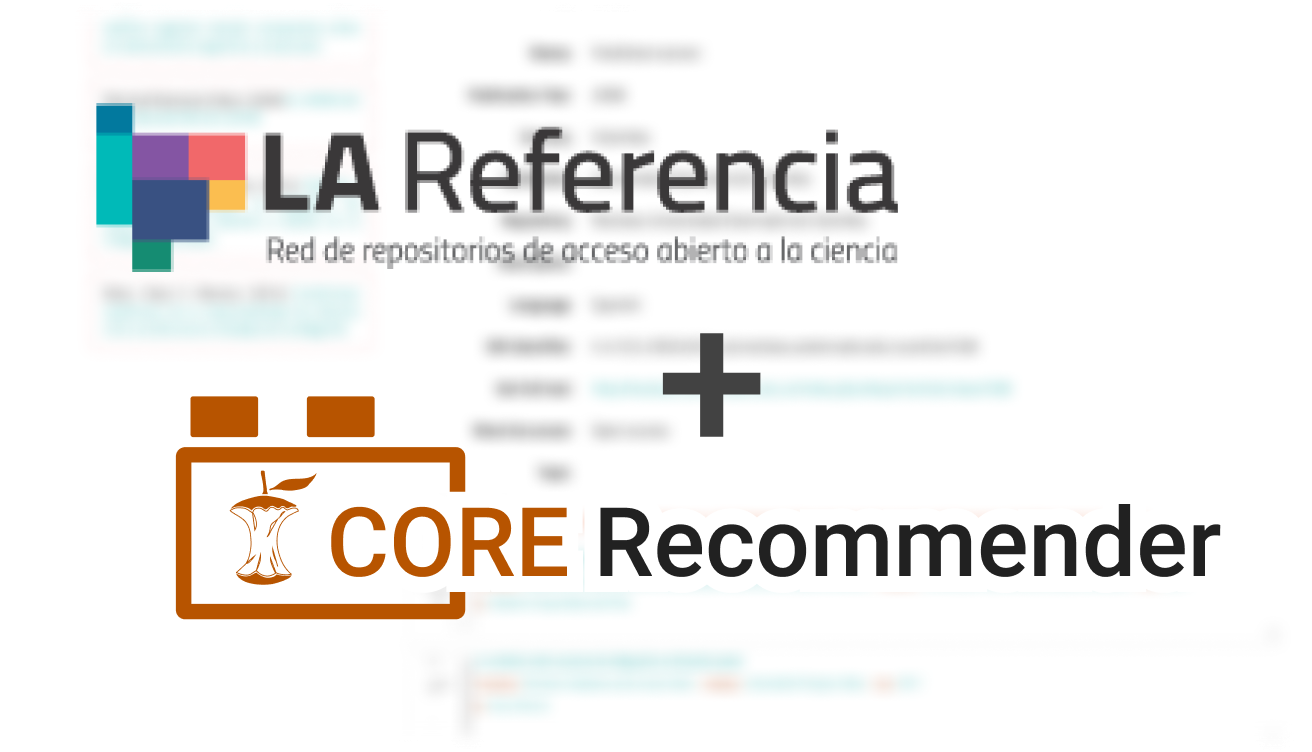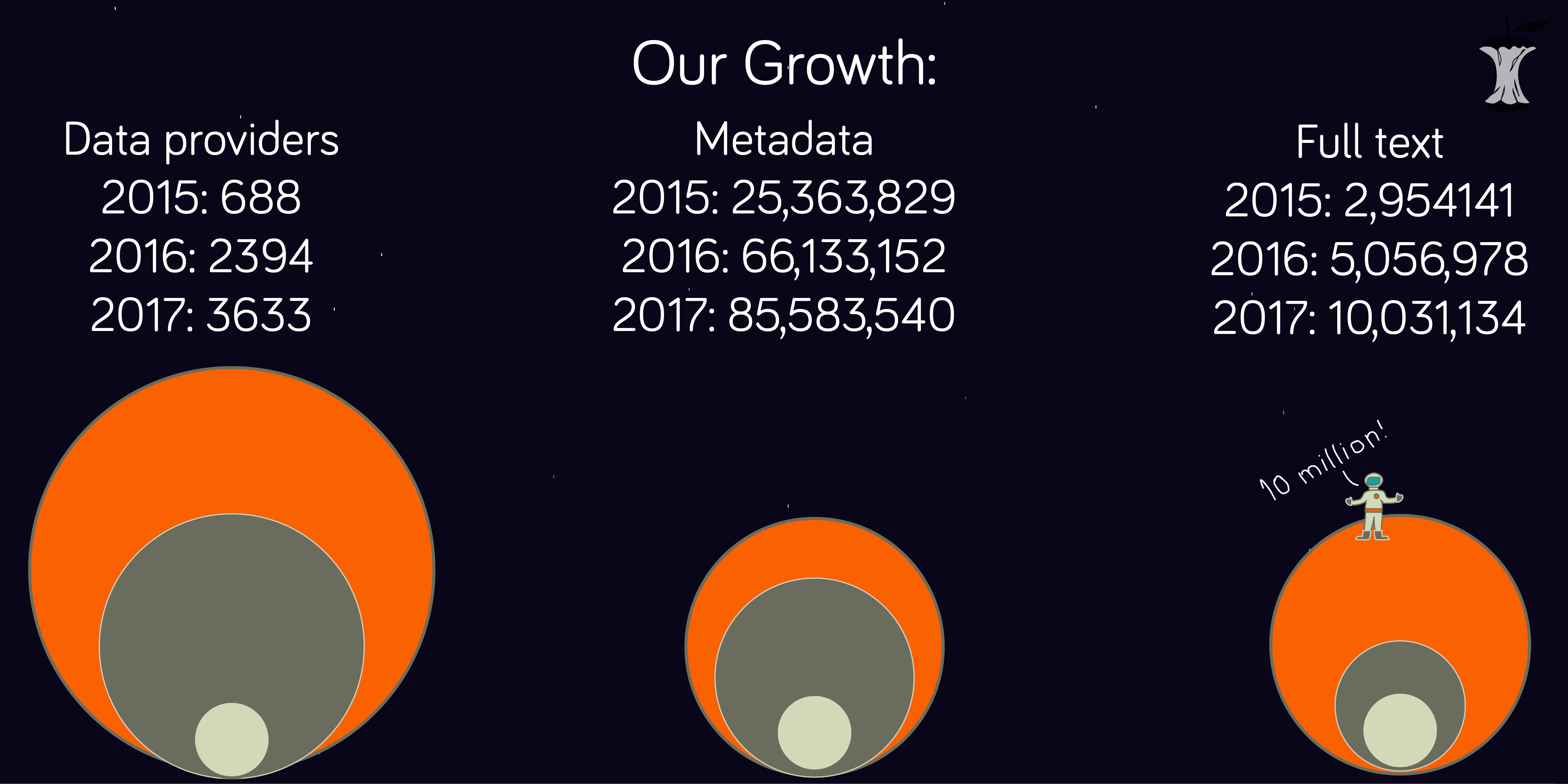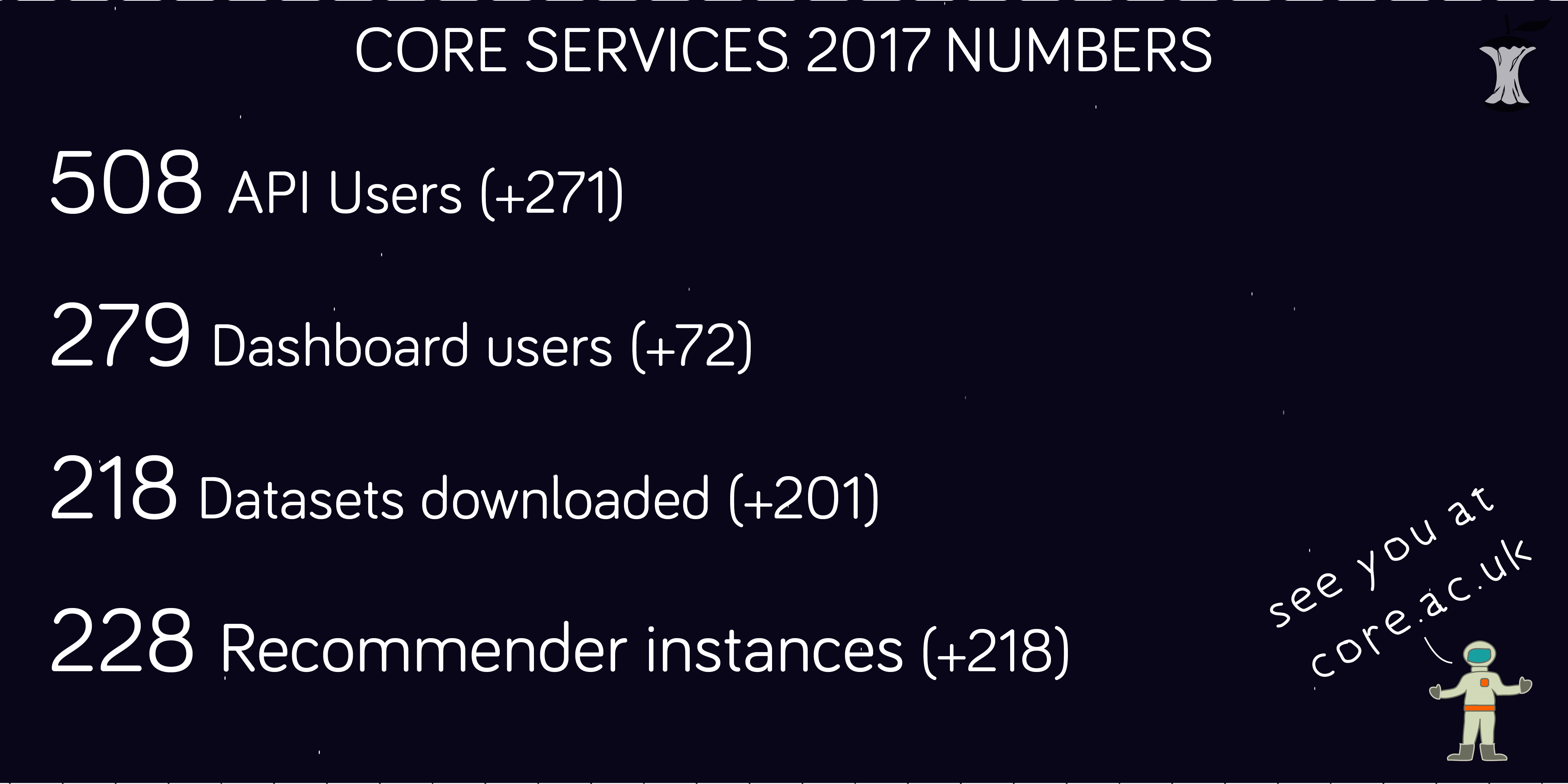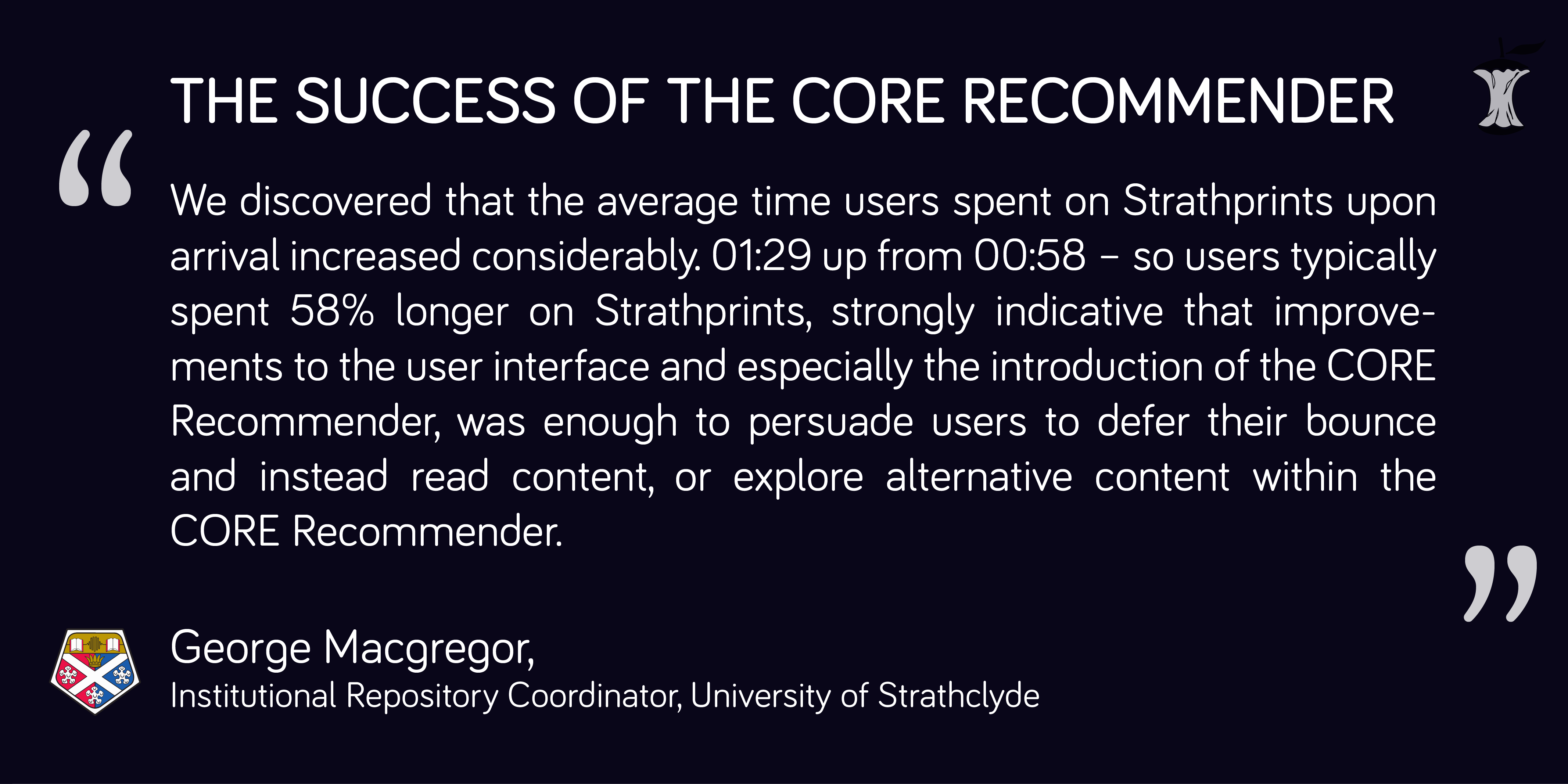CORE Recommender is a plugin for repositories, journals and web interfaces that provides suggestions on relevant articles to the article a user is looking for. The source of recommended data is the base of CORE, which consists of over 25 million full texts from CORE. Today we have interviewed George Macgregor, Scholarly Publications & Research Data Manager at the University of Strathclyde, responsible for the Strathprints institutional repository. Read about his experience of using CORE Recommender on the Jisc Research blog.
Category: recommender
CORE Recommender now supports article discovery on arXiv
This blog post was originally posted at the arXiv blog.
arXiv readers now have a faster way to find articles relevant to their interests. From an article abstract page, readers can simply activate the CORE Recommender to find additional open access research on similar topics.
The Recommender, part of the arXivLabs toolset, was developed by CORE, a global aggregator of open access scientific content, which provides access to millions of full texts. CORE’s mission is to aggregate all open access research outputs from repositories and journals worldwide and make them available to the public. In this way, CORE facilitates free unrestricted access to research for all.
CORE update for January to March 2020
The first quarter of 2020 was a highly productive period for CORE in terms of growing and developing our products. Details about these and more news can be found below.
CORE is ready to release a premium version of the Repository Dashboard
The CORE team has developed a premium edition of the CORE Repository Dashboard, with a particular focus being on the development of features that support compliance assessment with the REF 2021 Open Access Audit.
The new CORE Repository Dashboard contains a brand new REF compliance and DOI enrichment tabs. This service has been developed to support Higher Educational Institutions (HEIs) with repositories. More specifically, repository managers, research administrators, etc. The interface offers valuable technical information and statistics. Users can benefit from the tool by accessing information that will help them to improve the harvesting of their repository outputs and increase the visibility of their content. The premium edition is currently available to a limited number of users and we plan to expand to all interested institutions in the future. The release of the new version will be announced through a CORE blog-post.
CORE Recommender installation for DSpace
In this blog post, Alex Efimov, Staff Engineer at the Research Office of the Ural Federal University, gives a step by step guide on how to install the CORE Recommender on DSpace. The post is also available in Russian.
The CORE Recommender is a large and complex service, while its main purpose is to advance a repository by recommending similar articles. This blog post reviews only the plugin for a dspace/jspui based repository. The source of recommended data is the base of CORE, which consists of metadata descriptions and full texts. In addition, this plugin can recommend articles from the same repository as well.
Are you an iOS user? Access scientific articles in your device without hitting a paywall
Another year has passed and left a lot of good news, investigations and developments for CORE. Today we would like to tell you about one of them – Open Access (OA) Helper, an application developed for iOS mobile devices by Claus Wolf. We asked Claus to tell us how he came up with the OA Helper and here is what he answered.
When, where and why did you decide to develop OA Helper app?
In October 2018, I learned about how open access discovery services connect users to legal Open Access copies of otherwise paywalled articles. The available plugins weren’t available for Safari, my preferred browser, so I decided to give creating one a try.
Releasing a new CORE Discovery browser extension
 CORE Discovery helps users find freely accessible copies of research papers that might be behind a paywall on the publisher’s website. It is backed by our huge dataset of millions of full text open access papers as well as content from widely used external services beyond CORE. The tool not only provides state-of-the-art coverage of freely available content, it is the only discovery service which:
CORE Discovery helps users find freely accessible copies of research papers that might be behind a paywall on the publisher’s website. It is backed by our huge dataset of millions of full text open access papers as well as content from widely used external services beyond CORE. The tool not only provides state-of-the-art coverage of freely available content, it is the only discovery service which:
- delivers state-of-the-art performance compared to other discovery tools in terms of both content coverage (finding a freely available copy when it is available) and precision (reliably delivering a free copy of the paper on success);
- is run by researchers for researchers (as opposed to companies);
- has the best grip on content from the global network of open repositories;
- can deliver to readers other relevant freely available research papers even in situations where a freely available version is not available from anywhere on the web.
To satisfy the needs of CORE users, the world’s largest global aggregator of open access research papers now helps users access articles of their interest. Generally, discovery tools can find typically free copies of papers for about 15%-30% of published documents (slide 11). This means that in more than 70% of cases, they don’t bring to the user anything useful. CORE Discovery can offer the user relevant documents even in situations where other discovery tools are not successful. What distinguishes CORE Discovery from other discovery services on the market is that it does not stop when an open access version is not available, but always aims to offer related open access articles to the end user.
LA Referencia integrates CORE Recommender in its services
LA Referencia – an aggregator of research papers from Latin America collaborates with CORE – a scholarly communications infrastructure that provides access to the world’s largest collection of open access research publications, acquired from a global network of repositories and journals.

CORE Recommender is now integrated within LA Referencia, allowing users to discover similar articles from across a network of thousand open access data providers. CORE Recommender acts as a gate to millions of open access research papers, suggesting relevant articles where the full text is guaranteed to be openly available. Moreover, the recommender delivers to users only free to read materials, i.e. materials that can be accessed without hitting a paywall.
CORE becomes the world’s largest open access aggregator (or how about them stats 2018 edition)
. More specifically, over the last 3 months CORE had more than 25 million users, tripling our usage compared to 2017. According to
CORE’s Open Access content has reached the Moon! (or how about them stats 2017 edition)
Our services are also growing steadily and we would like to thank the community for using the CORE API and CORE Datasets.
We also offer other services, such as the CORE Repositories Dashboard, CORE Publisher Connector and the CORE Recommender. We received great feedback with regards to the CORE Recommender, with George Macgregor, Institutional Repository Manager at Strathclyde University, reporting:
We are thrilled that this year CORE made it to the moon. Our next destination is Venus.
The CORE Team wishes you Merry Christmas and a Prosperous New Year!
* Note: Special thanks to Matteo Cancellieri for creating the graphics in this blog post.
Implementing the CORE Recommender in Strathprints: a “whitehat” improvement to promote user interaction
This guest blog post briefly reviews why the CORE Recommender was quickly adopted on Strathprints and how it has become a central part of our quest to improve the interactive qualities of repositories.
Back in October 2016 my colleagues at the CORE Team released their Recommender plugin. The CORE Recommender plugin can be installed on repositories and journal systems to recommend similar scholarly content. On this very blog, Nancy Pontika, Lucas Anastasiou and Petr Knoth, announced the release of the Recommender as a:
…great opportunity to improve the functionality of repositories by unleashing the power of recommendation over a huge collection of open-access documents, currently 37 million metadata records and more than 4 million full-text, available in CORE*.
(* Note from CORE Team: the up-to-date numbers are 80,097,014 metadata and 8,586,179 full-text records.).
When the CORE Recommender is deployed a repository user will find that as they are viewing an article or abstract page within the repository, they will be presented with recommendations for other related research outputs, all mined from CORE. The Recommender sends data about the item the user is visiting to CORE. Such data include any identifiers and, where possible, accompanying metadata. The CORE response to the repository then delivers CORE’s content recommendations and a list of suggested related outputs are presented to the user in the repository user interface. The algorithm used to compute these recommendations is described in the original CORE Recommender blog post but is ultimately based on content-based filtering, citation graph analysis and analysis of the semantic relatedness between the articles in the CORE aggregation. It is therefore unlike most standard recommender engines and is an innovative application of open science in repositories.
Needless to say, we were among the first institutions to proudly implement the CORE Recommender on our EPrints repository. The implementation was on Strathprints, the University of Strathclyde’s institutional repository, and was rolled out as part of some wider work to improve repository visibility and web impact. The detail of this other work can be found in a poster presented at the 2017 Repository Fringe Conference and
a recent blog post





